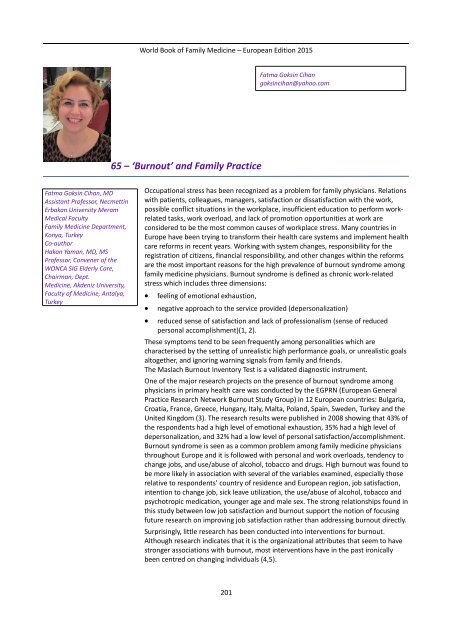Family Medicine
World Book 2015
World Book 2015
You also want an ePaper? Increase the reach of your titles
YUMPU automatically turns print PDFs into web optimized ePapers that Google loves.
World Book of <strong>Family</strong> <strong>Medicine</strong> – European Edition 2015<br />
Fatma Goksin Cihan<br />
goksincihan@yahoo.com<br />
65 – ‘Burnout’ and <strong>Family</strong> Practice<br />
Fatma Goksin Cihan, MD<br />
Assistant Professor, Necmettin<br />
Erbakan University Meram<br />
Medical Faculty<br />
<strong>Family</strong> <strong>Medicine</strong> Department,<br />
Konya, Turkey<br />
Co-author<br />
Hakan Yaman, MD, MS<br />
Professor, Convener of the<br />
WONCA SIG Elderly Care,<br />
Chairman, Dept.<br />
<strong>Medicine</strong>, Akdeniz University,<br />
Faculty of <strong>Medicine</strong>, Antalya,<br />
Turkey<br />
Occupational stress has been recognized as a problem for family physicians. Relations<br />
with patients, colleagues, managers, satisfaction or dissatisfaction with the work,<br />
possible conflict situations in the workplace, insufficient education to perform workrelated<br />
tasks, work overload, and lack of promotion opportunities at work are<br />
considered to be the most common causes of workplace stress. Many countries in<br />
Europe have been trying to transform their health care systems and implement health<br />
care reforms in recent years. Working with system changes, responsibility for the<br />
registration of citizens, financial responsibility, and other changes within the reforms<br />
are the most important reasons for the high prevalence of burnout syndrome among<br />
family medicine physicians. Burnout syndrome is defined as chronic work-related<br />
stress which includes three dimensions:<br />
<br />
<br />
<br />
feeling of emotional exhaustion,<br />
negative approach to the service provided (depersonalization)<br />
reduced sense of satisfaction and lack of professionalism (sense of reduced<br />
personal accomplishment)(1, 2).<br />
These symptoms tend to be seen frequently among personalities which are<br />
characterised by the setting of unrealistic high performance goals, or unrealistic goals<br />
altogether, and ignoring warning signals from family and friends.<br />
The Maslach Burnout Inventory Test is a validated diagnostic instrument.<br />
One of the major research projects on the presence of burnout syndrome among<br />
physicians in primary health care was conducted by the EGPRN (European General<br />
Practice Research Network Burnout Study Group) in 12 European countries: Bulgaria,<br />
Croatia, France, Greece, Hungary, Italy, Malta, Poland, Spain, Sweden, Turkey and the<br />
United Kingdom (3). The research results were published in 2008 showing that 43% of<br />
the respondents had a high level of emotional exhaustion, 35% had a high level of<br />
depersonalization, and 32% had a low level of personal satisfaction/accomplishment.<br />
Burnout syndrome is seen as a common problem among family medicine physicians<br />
throughout Europe and it is followed with personal and work overloads, tendency to<br />
change jobs, and use/abuse of alcohol, tobacco and drugs. High burnout was found to<br />
be more likely in association with several of the variables examined, especially those<br />
relative to respondents’ country of residence and European region, job satisfaction,<br />
intention to change job, sick leave utilization, the use/abuse of alcohol, tobacco and<br />
psychotropic medication, younger age and male sex. The strong relationships found in<br />
this study between low job satisfaction and burnout support the notion of focusing<br />
future research on improving job satisfaction rather than addressing burnout directly.<br />
Surprisingly, little research has been conducted into interventions for burnout.<br />
Although research indicates that it is the organizational attributes that seem to have<br />
stronger associations with burnout, most interventions have in the past ironically<br />
been centred on changing individuals (4,5).<br />
201


